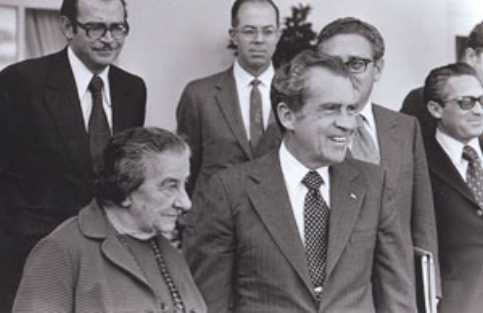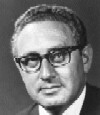National Security Archive 7 October 2003

Nixon and Golda Meir, 1 November 1973 (Photo: National Security Archive)
During the 1973 October War, Secretary of State Henry Kissinger secretly gave Israeli authorities a green light to breach a cease-fire agreement arranged with the Soviet Union, according to new documents published by the National Security Archive today on the war’s 30th anniversary. Declassified documents detail Kissinger’s efforts to buy time for Israeli military advances despite the impending cease-fire deadline. This episode is not discussed in Kissinger’s new book, Crisis, and was downplayed in his memoirs.

Henry Kissinger
“Meir…The Egyptians and the Syrians haven’t said anything [about the cease-fire]. They have said that the fighting continues.
Kissinger: You won’t get violent protests from Washington if something happens during the night, while I’m flying. Nothing can happen in Washington until noon tomorrow.
Meir: If they don’t stop, we won’t.
Kissinger: Even if they do …” [from Document 54]
“During the night,” Israeli forces launched a major attack and surrounded Egypt’s Third Army. Major violations of the cease-fire precipitated a diplomatic crisis with the Soviet Union, whose leaders suspected that Kissinger had made a deal with the Israelis. Diplomatic tensions led to a Soviet bluff to intervene that in turn led to a U.S. Defcon III nuclear alert. To settle the crisis, Kissinger would have to exert strong pressure against Tel Aviv. This marked the beginning of 30 years of U.S. focus on the Arab-Israeli conflict as a major policy priority.
Drawing on recently declassified material from the National Archives, this briefing book shows the complex role that the Nixon administration played during the crisis, maintaining backchannels with Arabs and Israelis, facilitating an Israeli military edge, while deterring a disastrous Arab defeat. Published here for the first time are documents disclosing:
Related Links: